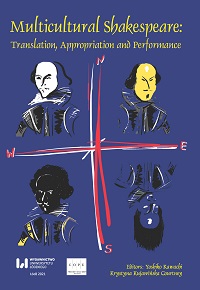“Forward and Backward”: Actants and Agency in Marlowe’s “Doctor Faustus” and Shakespeare’s “The Tempest”
DOI:
https://doi.org/10.18778/2083-8530.24.07Słowa kluczowe:
Posthumanism, Actant, Agency, Prospero, Doctor Faustus, Mephistopheles, Ariel, Caliban, Transmedial, entanglement, daemons, Robert Boyle, Thomas Hobbes, AristotleAbstrakt
This essay presents a posthumanist reading of Shakespeare’s The Tempest and Marlowe’s Doctor Faustus, two plays which feature a scientist/magus who attempts to control his environment through personal agency. After detailing the analogy between the agency of posthuman figures and the workings of computerized writing machines, as Katherine Hayles has proposed, my essay shows how Kott’s writing, especially his notion of the “Grand Mechanism” of history, anticipates the posthumanist theories that are currently dominating literary assessments. His critique of The Tempest makes this idea perfectly clear when he disputes the standard notion that Prospero represents a medieval magus; he instead argues that Prospero was more akin to Leonardo DaVinci, “a master of mechanics and hydraulics,” one who would have embraced revolutionary advances in “astronomy” as well as “anatomy” (1974: 321).
Pobrania
Bibliografia
Aristotle. The Complete Works. Ed. Jonathan Barnes. 2 Vols. Princeton U.P., 1995.
Google Scholar
Belsey, Catherine. The Subject of Tragedy: Identity and Difference in Renaissance Drama. 1985. 2nd ed. London, Methuen, 1995.
Google Scholar
Bennett, Jane. Vibrant Matter: A Political Ecology of Things. Durham NC. Duke University Press, 2010.
Google Scholar
DOI: https://doi.org/10.2307/j.ctv111jh6w
Bevington, David and Eric Rasmussen, eds. Doctor Faustus: the A- and B-Texts (1604, 1616), Christopher Marlowe and His Collaborator and Revisers, by Christopher Marlowe, Revels Plays Manchester and New York: Manchester Univ. Press, 1992.
Google Scholar
Campana, Joseph and Scott Maisano, eds. Renaissance Posthumanism. New York: Fordham P, 2016.
Google Scholar
DOI: https://doi.org/10.5422/fordham/9780823269556.001.0001
Chow, Rey. Entanglements, or Transmedial Thinking about Capture. Duke U.P., 2012 https://doi.org/10.1215/9780822395263
Google Scholar
DOI: https://doi.org/10.1215/9780822395263
Desmet, Christy. “Alien Shakespeares 2.0.” Actes des congrès de la Sociètè française Shakespeare (online 2017): 1-19.
Google Scholar
DOI: https://doi.org/10.4000/shakespeare.3877
Egan, Gabriel. Green Shakespeares: From Ecopolitics to Ecocriticism. New York: Routledge, 2006.
Google Scholar
DOI: https://doi.org/10.4324/9780203300770
Greimas, Algirdas Julien and Joseph Courtés. Semiotics and Language: An Analytical Dictionary. 1982.
Google Scholar
Haraway, Donna. The Companion Species Manifesto: Dogs, People, and Significant Others. Minneapolis: University of Minnesota Press, 2003.
Google Scholar
Hayles, N. Katherine. How We Became Posthuman. Chicago: U. of Chicago P., 1999 https://doi.org/10.7208/chicago/9780226321394.001.0001
Google Scholar
DOI: https://doi.org/10.7208/chicago/9780226321394.001.0001
Hayles, N. Katherine. “Unfinished Work: From Cyborg to Cognisphere.” Theory, Culture & Society 23(7-8): 159-166. 2006 https://doi.org/10.1093/litimag/8.1.159
Google Scholar
DOI: https://doi.org/10.1177/0263276406069229
Hayles, N. Katherine. Writing Machines. MIT press. 2002.
Google Scholar
DOI: https://doi.org/10.7551/mitpress/7328.001.0001
Kott, Jan. Shakespeare our Contemporary. Trans. Boleslaw Taborski. New York: W.W. Norton, 1974.
Google Scholar
Kott, Jan. “The Aeneid and The Tempest.” Arion: A Journal of Humanities and the Classics. New Series 3.4 (1976): 424-451.
Google Scholar
Kott, Jan, and Daniela Miedzyrzecka. “The Tempest, or Repetition.” Mosaic: An Interdisciplinary Critical Journal 10.3 (Spring 1977): 9-36.
Google Scholar
Kunat, John. “Play me False”: Rape, Race and Conquest in The Tempest.” Shakespeare Quarterly, Vol. 65.3: (2014): 307-327 https://doi.org/10.1353/shq.2014.0036
Google Scholar
DOI: https://doi.org/10.1353/shq.2014.0036
LaGrandeur, Kevin. “Early Modern.” Literature and the Posthuman. Ed. Bruce Clarke and Manuela Rossini. Cambridge UP, 2017. 16-28.
Google Scholar
DOI: https://doi.org/10.1017/9781316091227.005
Latour, Bruno. Politics of Nature: How to Bring the Sciences into Democracy. Trans. Catherine Porter. Cambridge: Harvard UP, 2004.
Google Scholar
DOI: https://doi.org/10.4159/9780674039964
Latour, Bruno. Reassembling the Social: An Introduction to Actor-Network-Theory. Oxford UP, 2005.
Google Scholar
Latour, Bruno. We Have Never Been Modern. Trans. Catherine Porter. Cambridge: Cambridge UP, 1993.
Google Scholar
Lupton, Julia Reinhard. “Creature Caliban.” Shakespeare Quarterly 51 (2000): 1-23 https://doi.org/10.2307/2902320
Google Scholar
DOI: https://doi.org/10.2307/2902320
Marlowe, Christopher. Doctor Faustus: The A- and B-Texts (1604, 1616), Christopher Marlowe and His Collaborator and Revisers, ed. David Bevington and Eric Rasmussen. Revels Plays. Manchester and New York: Manchester UP, 1992.
Google Scholar
“The Origin of the word Daemon,” http://ei.cs.vt.edu/-history/Daemon.html Accessed 12 August 2021.
Google Scholar
Oxford English Dictionary. Online http://www.oed.com. Accessed 17 July 2021
Google Scholar
Raber, Karen. Shakespeare and Posthumanist Theory. London: Arden Shakespeare, 2018.
Google Scholar
Sawday, Jonathan. Engines of the Imagination: Renaissance Culture and the Rise of the Machine. London: Routledge, 2007.
Google Scholar
DOI: https://doi.org/10.4324/9780203696156
Shakespeare, William. The Tempest. The Arden Shakespeare. Ed. Virginia Mason Vaughan and Alden T. Vaughan. London, 1999.
Google Scholar
Surrey, Henry Howard. Aeneid of Henry Howard Surrey. Ed. Florence H. Ridley. Berkeley and Los Angeles: U of California Press. 1963.
Google Scholar
Ubersfeld, Anne. Understanding Theatre. University of Toronto Press, 1999 https://doi.org/10.3138/9781442679023
Google Scholar
DOI: https://doi.org/10.3138/9781442679023
Pobrania
Opublikowane
Jak cytować
Numer
Dział
Licencja

Utwór dostępny jest na licencji Creative Commons Uznanie autorstwa – Użycie niekomercyjne – Bez utworów zależnych 4.0 Międzynarodowe.












